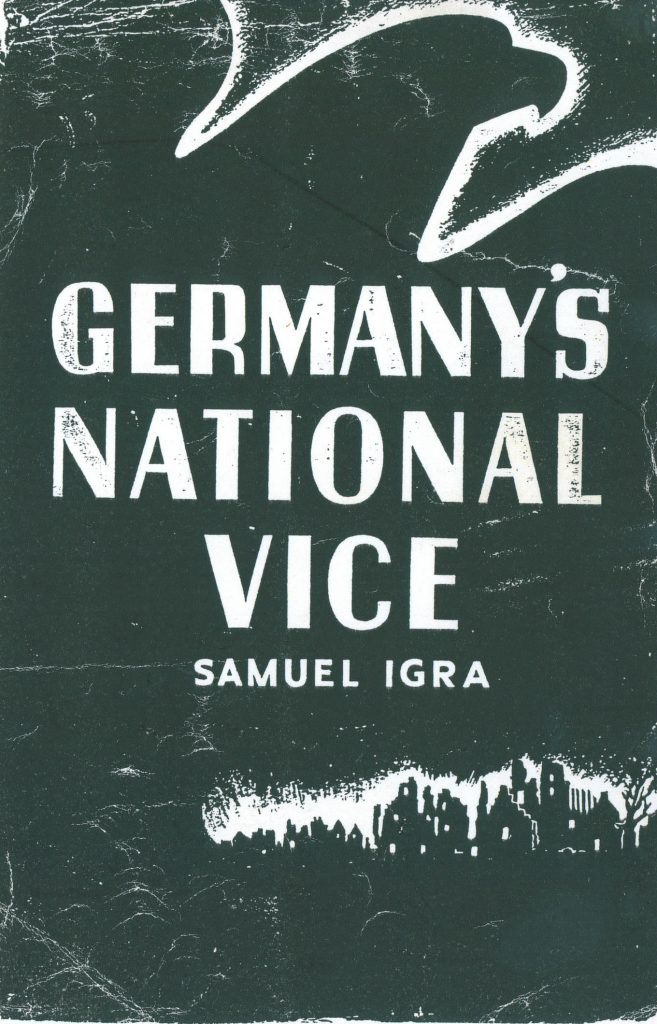
Read The Poisoned Stream HERE
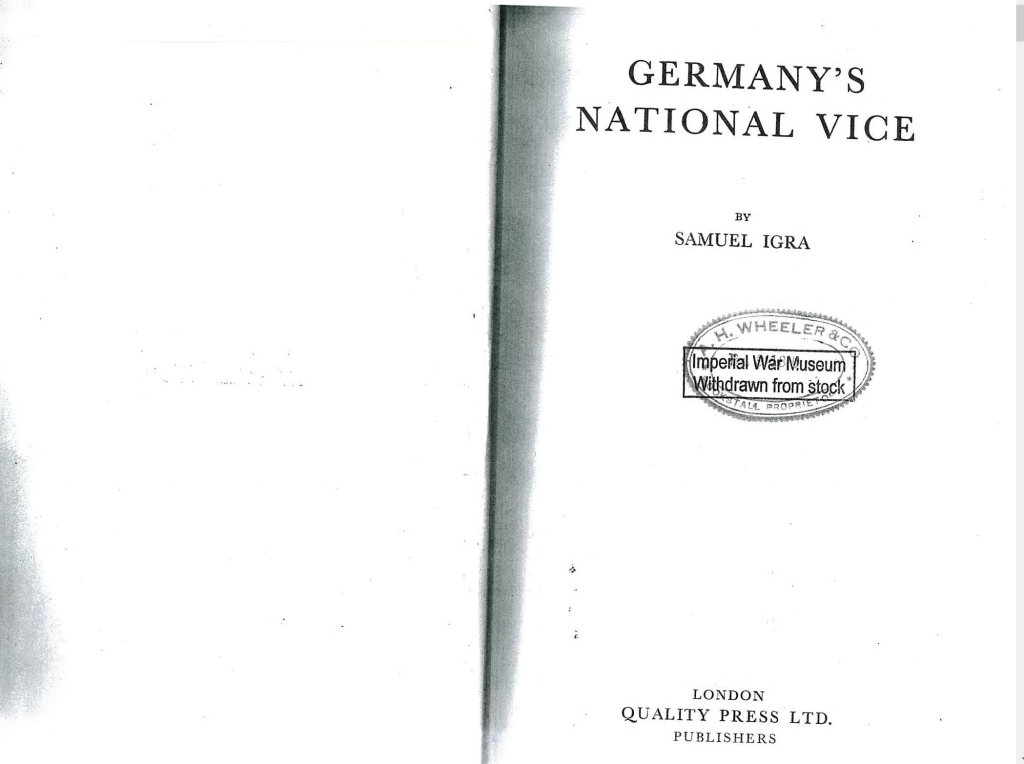
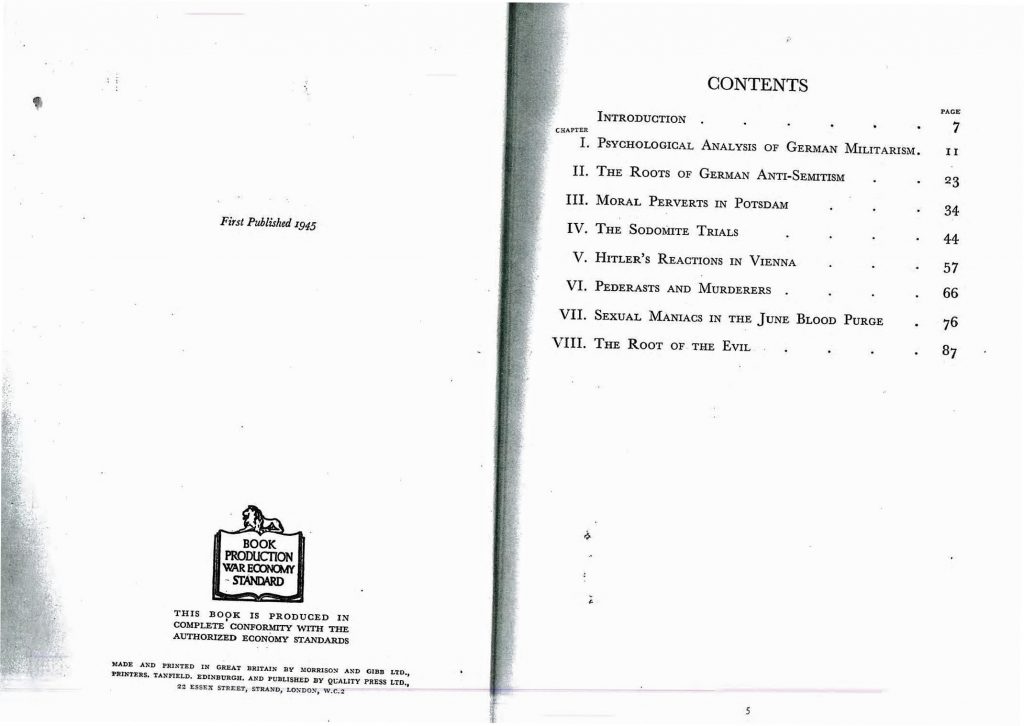
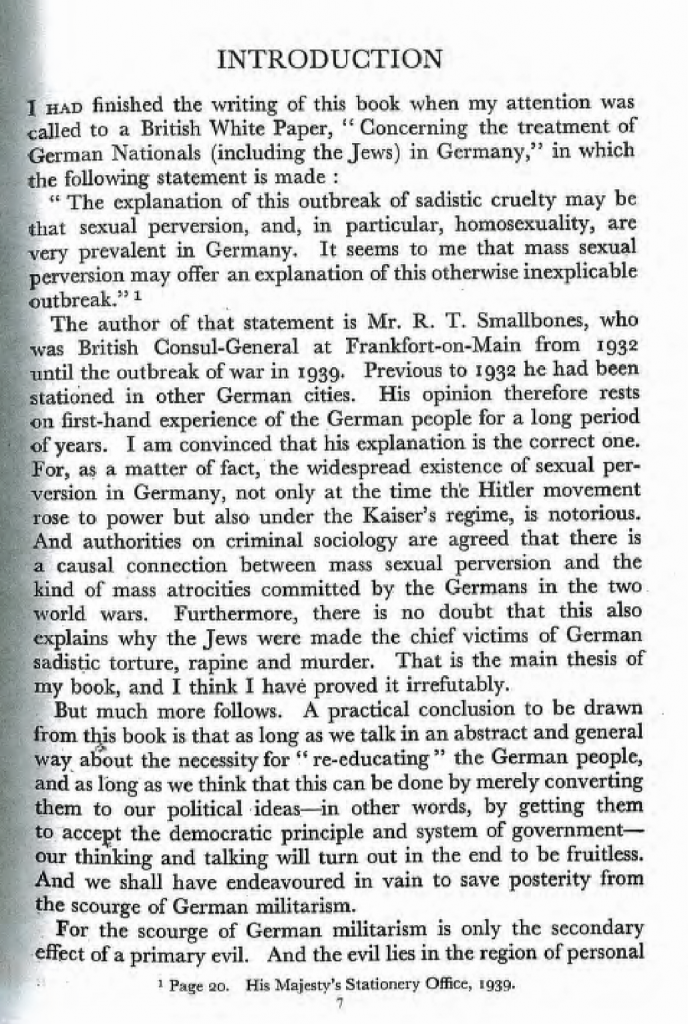
Click this button for a PDF of the official 1939 British document containing, on page 20, the report of R T Smallbones cited by Igra. Below is a photo of the front cover of the document:Download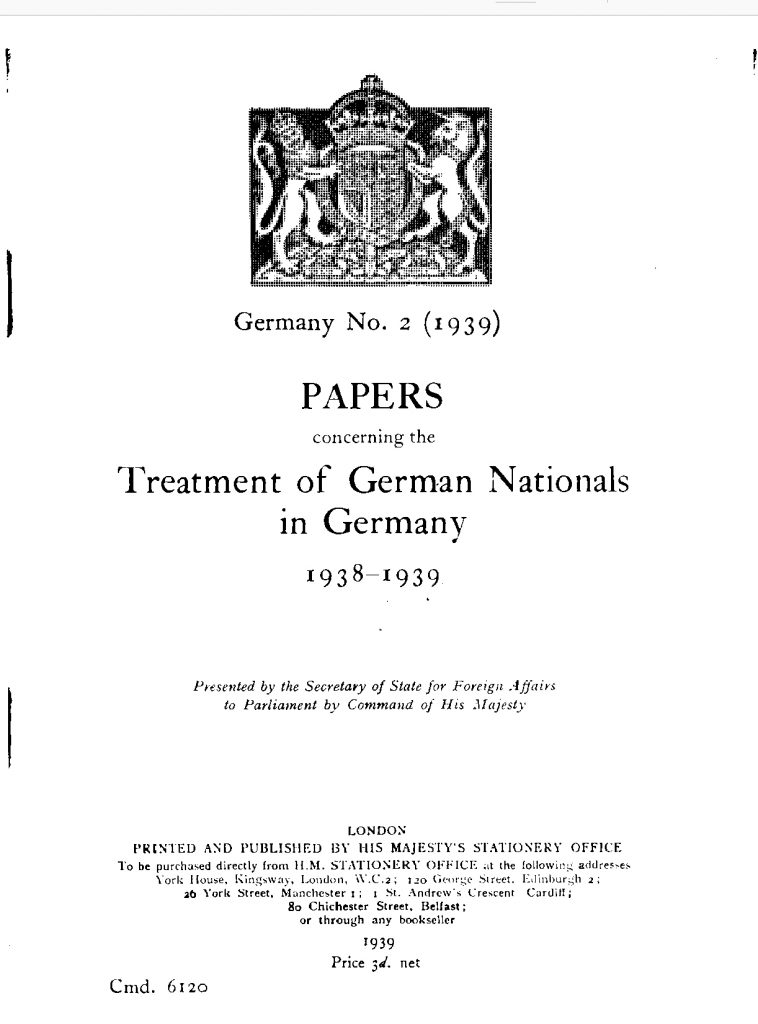
We have included a few pages of text from Germany’s National Vice below to highlight Igra’s competence as a writer and historian, and his Biblical worldview as a Jew of the Orthodox tradition who read and respected the New Testament. The only PDF we presently have of the full book is a scanned copy from a photocopier that is too big to upload as a single document. However, the most important excerpts from the book are contained and carefully cited in The Poisoned Stream where they are also analyzed in light of the larger context of the historical LGBT movement and agenda.
GNV INTRODUCTION continued…
morality, the region from which all political evil springs. The poison in Germany has penetrated from above downwards, from the leaders to the followers. This was true of Germany in the Middle Ages, when the Prussian State was first founded by the military pseudo-religious order of the Teutonic Knights, among whom the vice of homosexualism was rampant. The poison grew more virulent under Frederick the Great, who was himself a moral pervert. It broke out as a mass malady under the last Kaiser, whose court was the rendezvous of a camarilla that had made a cult of unnatural vices. This fact and the further fact that the origin of first world war was partly attributable to the scandals brought to light in connection with the Kaiser’s court, are proved by unquestionable documentary evidence in the present book. I have shown also how the Hitler movement has been contaminated by these vices from its very start, and how its violent anti-semitic bias is to be explained by reference to the uncompromising stand which Israel has maintained throughout her long history against practices that poison the sources of life itself. The Bible, both the Old and New Testament, had persistently denounced these vices in the most solemn manner. And that is one of the main reasons why national-socialist Germany has overthrown the Bible, in self-justification. The gangster-militarist clique in Germany were the originating source of that evil which has infected the whole body, politic of the German people, breaking out like rabies among them and forcing them in a compulsive urge to spread destruction all round. After the war it will not be sufficient to remove the seat of the infection, like a surgical operation for cancer, by simply overthrowing and eliminating gangster leadership. Here the poison has permeated the whole body, and it will take some time before healthy conditions are restored. This means that political re-education is not enough. There is a more fundamental necessity for moral re-education. But that problem does not come within the scope of the present book. I am interested mainly in the historical diagnosis of modern anti-semitism in Germany. This book is only a short introduction to a vast subject. As a member of the Jewish faith, I have for many years been interested in this question from the standpoint of Biblical teaching. My family were all of the orthodox Jewish tradition. From my childhood I was taught the Talmud and ever since then the Old Testament, as well as the Christian Gospels and Epistles have
been a subject of daily reading and meditation with me. I think, indeed I feel sure, that in them will be found the key to understanding many of the world’s ills to-day and also the way to restore the world’s health. Twenty-five years ago I came to live in Germany and remained there until 1939. My first reaction to German life stimulated in me a desire to investigate the moral background of their political behaviour, particularly at those periods when Germany played a prominent part in modern European history ; that is to say, the age of Frederick the Great, the German Empire under the Hohenzollerns, and the Third Reich under Hitler. It happens that in Germany, more than in any other modern country—with the exception of Japan—the persons who form the immediate entourage of the ruling caste give the cue to the nation as a whole and find an unquestioning response. Even their personal appearance is imitated by the rank and file of the public, as witness the prevalence of curled moustaches in the time of William II and the nation-wide fashion of wearing a short-cropped stubble on the upper lip in imitation of Hitler. In the like manner the lives of the gangster leaders are held up for admiration, their silliest sayings passed from lip to lip as if they were symbols of wisdom, their practice of chicanery and falsehood copied in everyday life —whoever has lived in Hitlerite Germany knows this—and their sexual morals adopted as a practical cult. In proof of this, one has only to read regularly Das Schwarze Korps, the official organ of the S.S.—the Black Guards. Consequently, the personal conduct of the leader group gives the key to the understanding of German public behaviour, the source from which the political and military behaviour arises. In the conduct of the leading personalities at each historical period of German military aggression I recognised a parallel with the Gibeah happenings, when the militarist tribe of the Benjamites aroused the whole of Israel against them. That long and bitter war arose from homosexual aggression and sexual murder perpetrated by the Benjamites. For this act the other eleven tribes of Israel made war on the Benjamites and carried on the war until the vice was stamped out of the nation. This struck me as a suggesting parallel between what happened then and what happened in connection with the first world war. The parallel is still closer with what is happening to-day. And there Is also a close parallel between the persecution of the Jews under
the decadent Roman Empire and the persecution of the Jews by the Hohenzollern Empire and Hitler’s Reich. I shall not further enlarge on that parallel here, as it is fully treated in the present book. There remains only one more remark to make, in order to warn against a possible misunderstanding. It is in connection with the word, homosexualism. I have used it throughout the book as a general term, applying not only to the unnatural practices generally associated with the name of Sodom, but also including all forms of anti-natural immorality in sexual conduct, such as rape with violence and other sadistic treatment of women. But there is the further and still more important connotation in the psychological field. This includes the attitude towards human life which expresses itself in that seemingly ineluctable life-destroying urge manifested by the Germans towards helpless persons who have come under their wrath, and also their disrespect for womanhood as the source and guardian of life’s beginnings. All these are direct products and offshoots of what the French call le vice allemand.
CHAPTER I
PSYCHOLOGICAL ANALYSIS OF GERMAN MILITARISM
THE phrase ” Prussian Militarism ” is a misnomer. To be historically correct we should speak of German Militarism ; for, paradoxically though it may sound at first, the Germans and not the Prussians were the founders of the militarist system which has proved such a scourge to the world. The distinction between Prussian and German in this connection is important, not merely from the standpoint of historical exactitude, but more particularly for the sake of practical guidance in the making of peace. If we think that by eliminating Prussian hegemony in Germany we remove all further danger of German military aggression we shall make a grave mistake. For German militarism is something that has existed and still exists independently of Prussia. Previous to the founding of the Prussian State, that part of the territory west of the Vistula which gave its name to Prussia was called Borussia, or West-Russia, and was inhabited by Slavonic tribes. Their country was invaded in the thirteenth century, and conquered by a military caste whose members were recruited from all over Germany, that is to say, from those parts of German territory lying south and west of the Elbe. So that the original founders of the Prussian State, and those who shaped and have held its military power from the beginning, were of non-Prussian origin. Furthermore, almost all the Nazi leaders came from the non-Prussian parts of Germany, and were of non-Prussian stock, principally Rhinelanders and Bavarians. Hitler himself came from Austria. And in this connection it is important also to note that, in order to make way for the Hitler regime, ‘the social democratic government of Prussia was over-thrown on July 20, 1932, by Chancellor Franz von Papen, who was a native of the Rhineland, and represented the industrial interests of that region. This coup d’etat, which abolished the autonomy of Prussia as a federative state in the Reich, was carried out with the aid of the German army chiefs. German militarism, therefore, is not confined to Prussia or the Prussian State. Hitherto the phrase has been used as a popular
slogan, without any serious attempt being made to define its meaning accurately or analyse it for the purpose of discovering its inner nature and origin. Historians seem to have evaded this investigation. Political leaders and writers whose countries have been the victims of German aggression, and sympathetic onlookers, often describe the iron discipline of the German barracks and the overbearing manners of German officers, pointing to these as expressing the essence of the German militarist spirit. In that way the Zabern incident, when a German officer drew his sword and wounded a French Alsatian youth, in 1913, because the latter had laughed at the officer in the street, gave rise to the terms ” Zabernism ” as a synonym for German militarism. Innumerable other incidents of a similar kind have been cited as examples of German militarism. But the Germans themselves consider these things as mere Nebensachen, matters of quite secondary significance. When such cases are cited against them they treat the accusation just as enemy propaganda, and adopt much the same attitude of cynical indifference when a British diplomat calls Germany ” The Butcher Bird of the Nations “. They ask, logically enough, how many other countries in the course of history have not made war for the purpose of territorial expansion ? Has no other country oppressed and exterminated a weaker neighbour for the sake of adding to its own wealth and power ? And how many countries can say with a clear conscience that they have always scrupulously honoured their signatures to solemn treaties ? During the first world war it was the custom to brand Germany with the accusation of having broken her treaty engagements when she invaded Belgium. But the Germans have always looked on that accusation as a piece of hypocrisy on the part of their enemies. And since then we have had innumerable instances of treaty-breaking by other nations. Let me cite one flagrant case : On August 27, 1929, fifteen states signed a pact which explicitly outlawed war as a means of international arbitrament. Among the signatories to this treaty were the United States, Great Britain, France, Germany, Italy and Japan. Subsequently almost all the nations of the world declared their adherence. The first two articles of the pact ran as follows : I. The High Contracting Parties solemnly declare in the names of their respective peoples that they condemn
recourse to war for the solution of international controversies, and renounce it as an instrument of national policy in their relations with one another. II. The High Contracting Parties agree that the settlement or solution of all disputes or conflicts of whatever nature or of whatever origin they may be, which may arise among them, shall never be sought except by pacific means. Three years after the signing of this solemn pact Japan attacked China, and seven years later Italy invaded Abyssinia. These two aggressors and treaty-breakers were among Germany’s enemies in the first world war, and had been loud in their denunciations of her for having dishonoured her signature to the treaty of 1839 in which she had guaranteed to respect the ‘independence of Belgium.
II
I have called attention to these facts here because they show that nations are not consistent in their moral conduct or their protests, and that the political aspect of events alters the moral aspect with the change of sides and the changing times. And few states have shown themselves conscious of the obligations they owe to their own individual citizens when they take decisions that involve moral principles. Much could be written on that theme. One might discuss, for example, how far the lack of integrity in the personal conduct of individuals towards one another, which is talked about so much to-day, may be due to the bad example given in the conduct of a nation’s policy. How can citizens be expected to behave justly and honourably in their private relations if in their plurality, as incorporate in the state, they are taught the doctrine that the end justifies the means and that treachery is justified in the conduct of public affairs if it prolies successful. Machiavellianism cuts both ways ; and it is generally true that political leaders who practise it will increase the number of evil-doers in their own country until finally public wrath will rise up and overthrow them. It would seem as if the Apostle Paul prophesied the events of our day when he wrote in his letter to the Romans (chap. i. 18) : ” For the wrath of God is revealed from heaven against all ungodliness and unrighteousness of men, who hold the truth in unrighteousness “.
To follow that line of thought, however, would carry us outside the scope of these pages. What I wish to emphasize here at the outset is that the habit of branding German militarism with the guilt of crimes that are common to many other nations as well, • and suggesting that this marks off Germany as the supremely guilty party among the world’s peoples, deserves to be condemned, because it only cloaks the evil it pretends to show up. In any historical investigation which would seriously aim at discovering facts that will be of practical use in guiding our policy towards Germany at this historical juncture we must discard slogans that apply all round. There is something at the source of German militarism which has poisoned the whole stream of German history ; and that something is different from the general evil of Machiavellianism that has also tainted the politics of other nations. To discover and isolate the virus at the core of German militarism we shall have to adopt a different line of historical research. The first clue to yield useful results here is to be found in the history of the Teutonic Knights who conquered and subjugated the Slavonic tribes inhabiting the regions between the Elbe and the Vistula, roughly speaking. That conquest took over fifty years, beginning in .1230 and continuing until the second last decade of the thirteenth century. These aggressors were the founders of the Prussian State ; but they were not Prussians themselves. They inaugurated a tradition that has marked German leadership ever since, and never more strongly than in our day. Who were the Teutonic Knights and what were their distinguishing characteristics ? They were one of the great military and religious orders to which the Crusades gave birth, ranking 4.01 with the Knights Templars and the Knights of St. John. The Teutonic Knights were called the ” Orden der Ritter des Hospitales St. Marien zu Jerusalem ” and membership of the Order was restricted to Germans of noble birth.. It was a monastic ‘association which combined the dominant interests of the time, those of the monk and soldier. The knight was permitted to wear the monkish habit over his coat of mail and he took vows of obedience, poverty and celibacy. When, after the failure of the Third Crusade and the truce in 1192 with Saladin, the heathen conqueror of Jerusalem, it became clear that the idea of ousting the Mohammedans from the Holy Land was hopeless, the
Teutonic Knights returned to Europe but did not demobilize. They still lived in communities as monkish soldiers and preyed on both the fears and the benevolence of the populace, especially in central and southern Europe. In 1230 the Teutonic Knights marched into the territories east of the Elbe with the avowed purpose of teaching religion at the point of the sword to the heathen Slavonic tribes inhabiting that region. They brought with them large hordes of German recruits and adventurers of all kinds as camp followers. These were granted lands and trading rights in return for feudal service to the Knights ; but the Knights themselves continued for a long time to live as members of a military monastic order, whose rules enjoined the strictest external observance, though in their personal lives they practised vices which were prevalent also in the other military monastic orders of the time. These vices found a natural soil in the non-religious and yet celibate lives led by these male communities and were stimulated by the anti-feminine bias of the members. Furthermore, once the purpose for which the warrior knights were first organized, namely, the liberation of the Holy Land from Mohammedan control, had been abandoned, they turned to other pursuits in direct contrast to the vows of poverty and obedience they had sworn. They bestowed on their German followers the lands they had confiscated from the native Slavonic tribes whom they partly exterminated and partly reduced to serfdom. The knights were the overlords who took rich perquisites by way of tribute from the newly created caste of Junker landholders and exacted blind obedience from the native population, often under the penalty of capital punishment for relatively trivial offences. It was in this way that German militarism started, and it has not altered essentially from that day to ours. F. W. Foerster, a German university professor who systematically opposed German militarism for thirty years, has published a book in English under the title Europe and the German Question (George Allen & Unwin Ltd., London, 1941) from which the following is taken :
THE TEUTONIC KNIGHTS AND PRUSSIAN MILITARISM
` The French Comte de Pange, whose family came from Lorraine recounts in his Soirdes de Saverne a typical impression he
received in his youth of the survival of the tradition of the TEUTONIC Knights in the older generation of German generals. He describes General Haeseler, who long before the war commanded the troops in Lorriane : The greyish-yellow countenance which, beneath his helmet, wore a surprisingly monastic expression is deeply impressed upon my memory. As is well known, he led a monk’s life. He remained unmarried and his sole lodging in Metz was a small room as bare as a monastic cell. But on the ceiling he had had a map of the frontier district painted so that as he lay in his camp-bed he could think over future battles. The visage of this monk-soldier has long haunted me and I realize that he and his fellows are continuing in soldier’s uniform the tradition of that great Order.’ ” Graf von Haeseler was no barbarian. He was a chivalrous foe. In the Prussian House of Lords he refused assent to the policy of expropriation which Prince Bulow sought to introduce against the Polish Landlords. Yet in 1893 he spoke as follows in an address to his troops. ‘ Our civilization must build its temple on mountains of corpses, an ocean of tears and the groans of innumerable dying men. It cannot be otherwise.’ This utterance made by such a man casts a glaring light on the entire Prussian mentality. When men like these are dealing with international politics, they take no account whatever of anything belonging to man’s life as a personal spirit, nor of religion, humanity, morality or honour. International politics are simply the interplay of natural forces ; and the man who stakes his strength in the game must, if he is to win, become himself but a part of merciless nature. This is the sacrifice he owes to his people, that it may not be trampled underfoot and that those may conquer who are biologically deserving of victory. ” All men educated in this school display the same inner cleavage however cultivated they may be. As soon as the conversation turns on politics their speech and thought suddenly breathe an arctic chill. It is not even political paganism. For the pagan believes in an ineluctable Divine government concerned even with political crime. But these men seem to be victims of a peculiar disease. Through generations and centuries of wars of annihilation, a virus has slowly poisoned the blood and in the associates and heirs of this barbarism has killed beyond hope of recovery the aboriginal instinct of the living human soul for the truth of the invisible world, even, or rather particularly, in the political field. Even a man of such high intellectual and artistic endowments as Frederick the Great gave proof, in the sphere of international politics, of what was little short of moral insanity. None of those statesmen who earnestly desire to maintain a moral order within the nation has ever suspected that his political methods are fatally inconsistent and that the time must come when all the blatant
immorality they practice and justify in foreign relations will turn towards and destroy all interior order and every principle of justice. On the contrary, those statesmen live untroubled in this complete contradiction and in the practice of a policy of such blind materialism that for generations they have deprived the political thought of their people of every higher light and thereby of any realism that penetrates the surface.” Influenced undoubtedly by a sense of delicacy and a desire to avoid shocking the moral sensitivity of his readers, Professor Foerster uses circumlocutory language in reference to the “peculiar disease ” which he rightly attributes to the German militarists. It must be remembered that the original text of his book was written before the appalling atrocities committed by the Germans during the second world war had horrified the civilized public in all countries. The realities have become too terrible to be described in any abstract or roundabout phraseology. We now have to call by its real name the ” peculiar disease “, ” the virus which has killed beyond hope of recovery the aboriginal instinct of the living human soul “, and ” the moral insanity ” shown by Frederick the Great. It is simply sexual perversion. Its morbid history in the German blood dates from the time of the Teutonic Knights, flowing onwards and downwards and expanding throughout the centuries until it reached a devasting flood in the Germany of the last Kaiser and of Hitler. This is the real canker at the root of German life, and is the veritable pest which has spread devastation so often throughout Europe. But homo-sexualism, or sexual perversion, must not be taken here in its restricted meaning as a physical vice or disease ; it has a far wider connotation, authenticated examples of which will be described later in this book. To return to the Teutonic Knights. Their personal lives were as infamous as the more widely published infamies of their brother knights, the Templars. These latter became so corrupt that they raised the ‘practice of their cardinal vice into a religious cult. Homosexualism being a practical denial of life at its very source, a perversion of nature, its addicts look with cynicism on the whole human race and the normal instincts of mankind. The Templars went so far as to worship animals, even cats, as a gesture of contempt for man’s Creator. Early in the fourteenth century they were condemned by Pope Innocent III, and Philip the Fair of France undertook the work of exterminating their communities.
There were innumerable public trials where the most revolting details were brought to light. On reading the evidence disclosing the moral chaos engendered by these military monastic orders one has the sensation of hearing the re-echo of St. Paul’s words which described a similar state of affairs in the pagan Rome of his time ; for it could likewise be said of the Knights that they Changed the glory of the incorruptible God into an image made like to corruptible man, and to birds, and fourfooted beasts, and creeping things. Wherefore God also gave them up to uncleanliness through the lusts of their own hearts to dishonour their own bodies between themselves : Who changed the truth of God into a lie, and worshipped and served the creature more than the Creator, who is blessed for ever. Amen. (ROMANS Who changed the truth of God into a lie, could be taken as a literal description of the policy followed by Germany since the time of Frederick the Great. Count Haeseler, of whom Professor Foerster speaks, defended the Poles in the Prussian House of Lords, but he did not take that stand for the sake of the Poles. His purpose was to win Polish sympathies for Germany, so that she could carry out her policy of aggression against Russia and subsequently against France. That was during the Hohenzollern regime. Hitler followed the same policy towards Poland in 1934 when he signed a ten years’ pact of friendship with them, for the ulterior purpose of using them as an instrument against Russia and France. Unfortunately the Poles allowed themselves to be deceived into believing that Hitler would stand by his word. The same kind of deception was employed at Munich in 1938. And worshipped and served creatures more than the Creator describes one of the outstanding personal characteristics of Frederick the Great, whom Hitler and the Nazis have taken as their exemplar. Frederick hated womanhood as such. Die Frau was always a Schimpfwort, an expression of contempt, with him. He also hated men in general ; but he loved his dogs. He slept with them, and when they died he had monuments placed above their graves. As the tourist visits The Palace of Sans Souci at Potsdam he is shown a row of graves, each with its monumental stone, situated in a place of honour on the green sward fronting the left wing of the Palace itself. These are the graves of Frederick’s dogs.
Though he felt obliged by reason of his position to have a queen, which involved the necessity of getting married, Frederick never lived a husband’s life. And although Luther’s Reform inculcated the marriage of the clergy, with a view to stamping out the vices that had characterized celibacy in Germany, and though the same injunction logically applied to soldiers, Frederick forced the majority of his officers to remain unmarried. In doing this he flouted one of the fundamental measures enacted by the Reformation for the moral regeneration of Germany. In his army he revived the vices of the Teutonic Knights and the Templars. Frederick is rightly looked upon as the founder of modern German militarism, not merely as state policy but as a worship of destruction for its own sake. He despised humanity in general and looked on human life, even his own life, as a bagatelle. He constantly carried a phial of poison on his person, so that he might put an end to his life at any moment he considered opportune. Frederick had his successors in the group of moral perverts that surrounded the last Kaiser : Moltke, Haessler, Eulenburg, Lynar, Wedel, Schulenburg, Hohenau, etc., etc., to say nothing of the Kaiser’s cousin, King Ludwig II of Bavaria and his associates. The lives of these men seem like a prophetic fulfilment of the description given in the first chapter of Paul’s letter to the Romans, verses 27-32. And likewise also the men, leaving the natural use of the woman, burned in their lust towards another : men with men working that which is unseemly, and receiving in themselves that recompense of their error which is meet. And even as they did not like to retain God in their knowledge, God gave them over to a reprobate mind, to do those things which are not convenient. Being filled with all unrighteousness, fornication, wickedness, covetousness, maliciousness ; full of envy, murder, debate, malignity ; whisperers. Backbiters, haters of God, despiteful, proud, boasters, inventors of evil things, disobedience to parents. Without understanding, covenant breakers, without natural affection, implacable, unmerciful. Who knowing the judgement of God, that they who commit such things are worthy of death, not only do the same and have pleasure in them that do them. This indictment could he taken as an historical description
of the men around the Kaiser who brought on the first world war and also Hitler, together with his immediate followers, who plunged humanity into the greatest disaster of all time. Conscious of this, Count Schulenburg, a leader of the homosexualist group around William II, tried to give a completely contrary meaning to the words of the Apostle.
III Professor Foerster himself furnishes an example of the confused and contradictory ways of thinking on these matters which is common to the generality of people. He speaks persistently of ” Prussian Militarism “, but he admits that it was the Germans from outside Prussia who invaded that country and established their militarist system there. In Chapter IV of the book I have mentioned he writes under the heading :
THE ENTRANCE OF PRUSSIA INTO GERMAN HISTORY
” THE ECCLESIASTICAL ORIGIN OF THE PRUSSIAN STATE ” ” What was the root stock from which grew that historical power we call Prussia ? How did Prussia rise to power ? What enabled it to dominate completely the German soul ? How did its conflict with Europe develop ? How will the conflict end ? ” Amidst the dense primeval forest which covered the plain around the Vistula, a picked body of knights from every part of Germany—with the special blessing of Rome and extensive privileges, employing the administrative and economic methods brought from the East and supported by the Hanseatic towns and settlers from the whole of Germany—after a war of extermination that lasted for sixty years, founded a model state which gradually extended its territory to the Rhine and imbued Germany as a whole with its military spirit and love of order until the conflict with the entire world matured. This surely is one of the most dramatic chapters in the history of mankind. It will repay us to study the psychological and sociological factors which determined this development.” That is perfectly true. It is a study that deserves the closest attention, and one may be permitted to express a feeling of regret that Professor Foerster did not pursue it further. He would have
discovered three dynamatic elements constituting the background from which German militarism has emerged. Those elements are : (r) the militarist order of the Teutonic Knights ; (2) the forces of commercialism represented by the German Hanseatic League ; (3) the religious sanction emanating from Rome. These three elements acted conjointly in subjugating the Borussian inhabitants of the Vistula basin, partly exterminating them and imposing on them that form of totalitarianism which afterwards became known as the Prussian State. The collaboration of Rome and the Hanseatic League was given under false pretences, the former claiming that its intention was to use the German military order as an instrument for the spread of Christianity among the heathen Slavs, while the avowed purpose of the Hansards was the extension of their trade to the whole Vistula basin. But the former could have been achieved by missionaries carrying the Cross rather than the sword ; and if the policy of the German Hanseatic League had been really motivated by a sincere desire to develop the economic resources of that territory they could have done so by peaceful penetration following the work of the Christian missionaries. But neither of those two parties was actuated by a religious or humane purpose. The papacy wished to help in extending the political frontiers of the so-called Holy Roman Empire of the German Nation, while predatory instruments were at the source of the Hanseatic policy. The main driving force in the whole movement, however, was the Teutonic Order, actuated by the lust for military conquest as an end in itself and further stimulated by a blind urge to destroy and inflict torture on innocent peoples. That has always been a characteristic outlet for the compelling moral evil that held the Teutonic Knights in its grip. And there was a particular reason why the evil should vent its wrath against the Slavs.; for the Slavs, as a people, just as the Jews, have always been opposed to those unnatural vices of which the Apostle Paul speaks in his letter to the Romans. Here we have the real psychological factors causing the eternal conflict between Germans and Slavs. Much the same may be said of the traditional conflict between the Germans and the French. In abolishing the Knights Templars, though it took years of bitter conflict, Philip the Fair stamped out in France those vices for which the Templars were infamous, and also the Teutonic Knights………………..
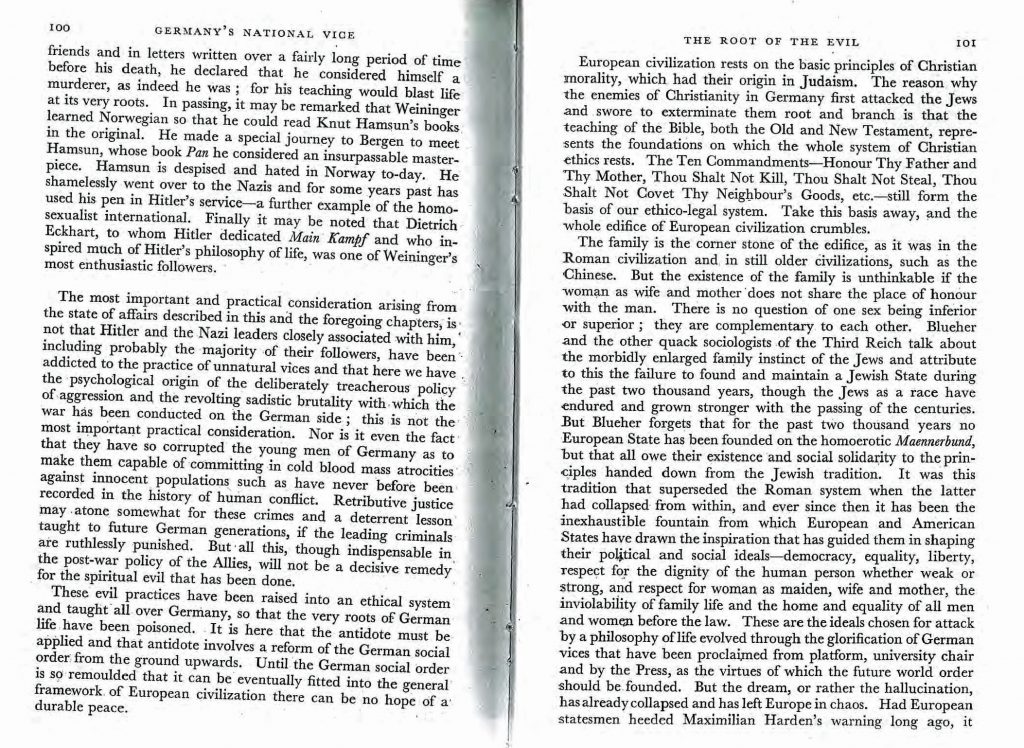
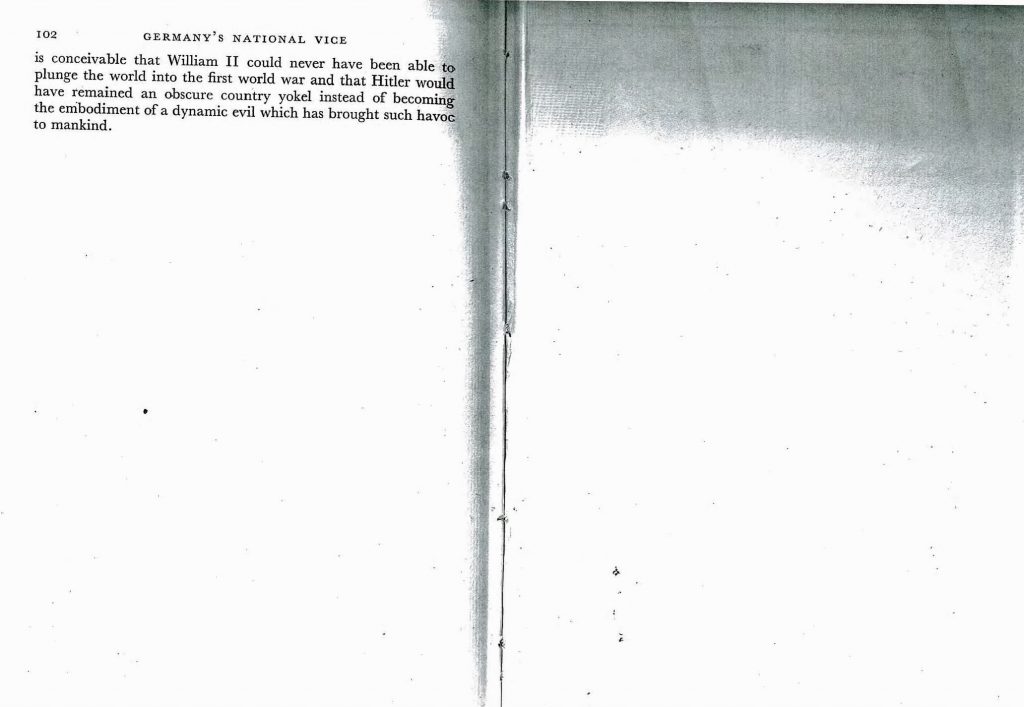
For more on this theme
Read The Poisoned Stream HERE
Read The Pink Swastika HERE



